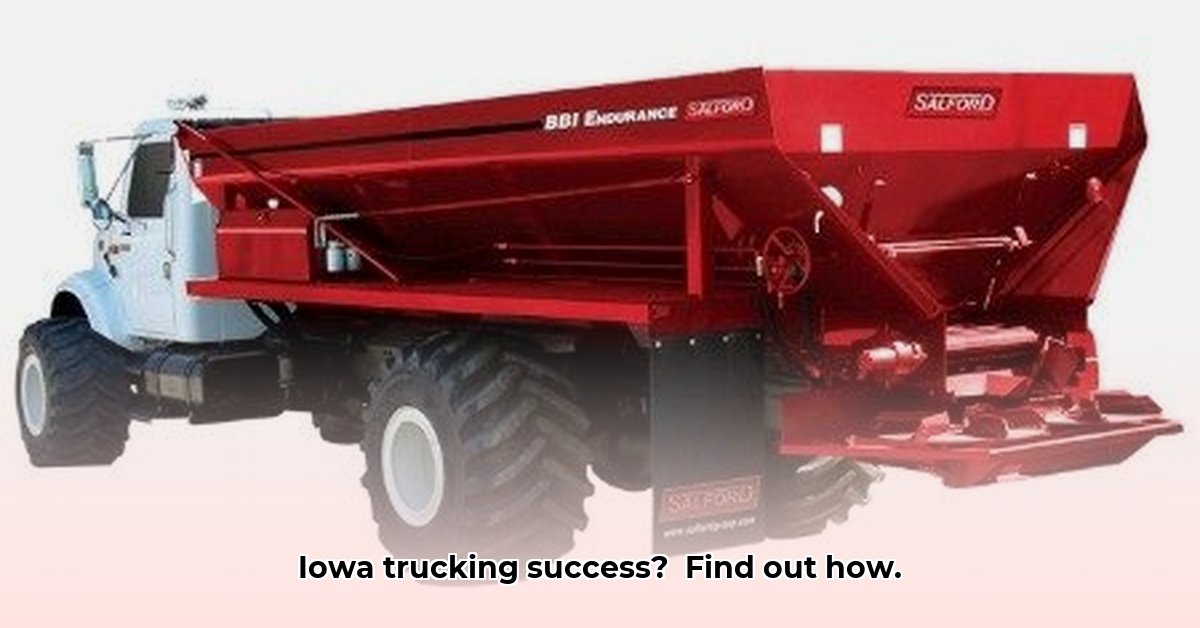
Endurance Truck & Equipment (ETE), a relatively young trucking company established in Mount Vernon, Iowa in 2022, presents a compelling case study in navigating the complexities of the Iowa trucking industry. This analysis examines ETE's challenges and opportunities, offering actionable intelligence for the company, the Iowa Department of Transportation (Iowa DOT), economic development agencies, and financial institutions.
Company Overview
ETE, founded in 2022 and based in Mount Vernon, Iowa, operates within the competitive Iowa trucking market. Its location suggests a potential focus on agricultural haulage, given the region's agricultural prominence. This niche specialization offers both advantages and risks; while providing a potential competitive edge, it also creates dependence on a single sector. ETE's early success hinges on establishing a strong reputation for reliability and navigating the industry's inherent challenges.
Iowa Trucking Industry Analysis: Headwinds and Tailwinds
Iowa's trucking industry is characterized by significant challenges impacting all players, especially newer entrants like ETE. These challenges include:
- Driver Shortages: The persistent shortage of qualified drivers drives up labor costs and impacts operational efficiency across the board. This necessitates proactive recruitment and retention strategies.
- Fuel Price Volatility: Fluctuations in fuel prices significantly impact profitability, requiring companies to implement fuel-cost management strategies (hedging, route optimization, etc.).
- Regulatory Changes: Compliance with evolving regulations necessitates ongoing investment in training and administrative resources.
However, opportunities also exist:
- Agricultural Haulage: Iowa's strong agricultural sector creates consistent demand for trucking services, especially for specialized agricultural haulage. This niche represents a potential area for significant growth and market dominance for ETE.
- Technological Advancements: Telematics and other technologies offer opportunities for increased efficiency in route optimization, fuel management, and fleet maintenance, enhancing profitability.
ETE's Strategic Path: Short-Term and Long-Term Strategies
ETE's success hinges on a well-defined strategic plan addressing both short-term and long-term objectives:
Short-Term Goals (0-1 Year):
- Secure Essential Permits and Licenses: This is paramount for legal operation and avoiding significant risks.
- Cultivate Strong Client Relationships: Building trust and reliable service are crucial for securing repeat business and building a strong reputation.
- Implement Fuel Cost Management: Proactive strategies to mitigate fuel price volatility are essential for profitability, (e.g., fuel hedging, route optimization).
- Leverage Niche Market Specialization: Focus on agricultural haulage to differentiate ETE within the competitive landscape.
Long-Term Goals (3-5 Years):
- Client Base Diversification: Reducing dependence on a single industry or client is key to long-term stability and mitigating risk.
- Fleet Modernization: Investing in newer, fuel-efficient trucks reduces operating costs and enhances efficiency.
- Technology Integration: Implementing telematics and other technologies optimizes operations and provides valuable data-driven insights.
- Controlled Expansion: Sustainable growth is prioritized over rapid, unsustainable expansion.
Actionable Recommendations for Stakeholders
ETE's success depends on collaboration among various stakeholders:
- Endurance Truck & Equipment: Focus on building a strong brand reputation, implementing efficient cost-management strategies, and continuously adapting to market changes.
- Iowa DOT: Streamlining licensing processes and investing in infrastructure improvements can reduce administrative burdens for trucking companies.
- Iowa Economic Development Agencies: Providing targeted financial support and business development programs for small trucking companies is crucial for fostering growth.
- Financial Institutions: Offering access to affordable and flexible financing options will facilitate fleet upgrades and expansion for businesses like ETE.
Conclusion: A Promising Future
Endurance Truck & Equipment’s future in the Iowa trucking industry is promising but requires a strategic approach to navigate inherent challenges. By focusing on niche specialization, adopting efficient technologies, and fostering strong collaborations, ETE can achieve sustainable growth and contribute significantly to the Iowa economy. The key lies in harnessing the considerable opportunities within the state’s trucking sector while proactively mitigating the accompanying risks.